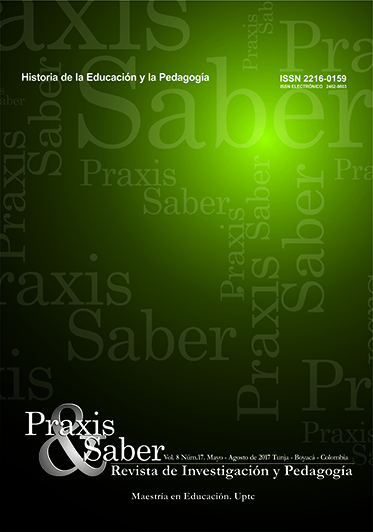Las vivencias como estrategia de fortalecimiento del pensamiento crítico en educación rural

Resumen
Este artículo presenta los resultados obtenidos al implementar una estrategia pedagógica encaminada a fortalecer el pensamiento crítico a través de la argumentación oral, fundamentada en las vivencias y contexto del estudiante, lo cual generó espacios de interacción que le permitieron entender y tomar postura frente a las problemáticas sociales y ambientales de su entorno y experiencias de vida. Para ello, se recurrió a los planteamientos de Henry Giroux (1990) y de Paulo Freire (2005), quienes proponen “un pensar reflexivo y crítico que cuestione, analice e interprete la realidad en la que se vive”. Los aspectos relevantes en el diseño de la estrategia, estructurada en cuatro etapas, son: tematización, apropiación vivencial, problematización y argumentación basada en el uso de secuencias argumentativas, que brindan la oportunidad de expresar en forma verbal saberes, inquietudes, conocimientos, argumentos razonados y proponer soluciones a problemáticas del contexto rural. Se concluye que al enfrentar al niño con su realidad desde la praxis, intereses y vivencias, se desarrollan habilidades de pensamiento que fortalecen la construcción de conocimientos significativos, que lo hacen un agente activo, participativo y con conciencia crítica frente al proceso de enseñanza aprendizaje.Palabras clave
pensamiento crítico, vivencias, secuencias argumentativas, expresión oral, contexto rural
Biografía del autor/a
Doris Lilia Torres Cruz
Docente de tiempo completo Doctorado en Ciencias de la Educación Proyecto de Investigación Fortalecimiento del pensamiento crítico en estudiantes de Educación Básica Primaria a través de la argumentación oral. Grupo de Investigación Lenguajes en Educación-LEEN
Widy Patricia Fonseca Villamil
Licenciada en Educación Preescolar
Blanca Nieves Pineda Jaimes
Licenciada en Educación Básica
Citas
- Albert, M.J. (2007). La investigación Educativa. España: Mc Graw Hill.
- Austín, J.L. (2005). Cómo hacer cosas con palabras: Palabras y acciones. Barcelona: Paidos
- Alvarado, M. y. (2011). Estrategias metodológicas que permiten el desarrollo del pensamiento crítico en la comprensión lectora. Milagro, Ecuador: Universidad Estatal de Milagro.
- Connerly, D. (diciembre de 2006). Teaching Critical Thinking Skills to Fourth Grade Students Identified as Gifted (Submitted in Partial Fulfillment for Masters of Education in Collaborative Teaching and Learning). Cedar Rapids, Iowa: Graceland University. Traducción de las autoras.
- Dolz, J. (1995). Escribir textos argumentativos para mejorar su comprensión. En A. C. Dolz, Comunicación, Lenguaje y Educación. Enseñar a argumentar (págs. 26, 65-77). Madrid: Edisa. https://doi.org/10.1174/021470395321340448 DOI: https://doi.org/10.1174/021470395321340448
- Dolz, J., & Pasquier, A. (1996). Argumentar para convencer. Ginebra: Gráficas Ona.
- Freire, P. (2006). Pedagogía del oprimido. México: Siglo XX editores.
- Giroux, H. (1990). Los profesores como intelectuales: hacia una pedagogía crítica del aprendizaje. Barcelona: Paidós.
- Janik, A., & Toulmin, S. (1998). La Viena de Wittgenstein. Bogotá, Colombia: Taurus.
- Mckernan, J. (2001). Investigación acción y curriculum. Londrés: Morata.
- McLaren, P. J. (2008). Pedagogía crítica. España: GRAÓ, dIRIF,S.L.
- Martínez, M. (2002). Estrategias de lectura y escritura de textos perspectivas teóricas y talleres. Cali, Colombia: Cátedra UNESCO MECEAL.
- Ocampo, L. (2007). Pensadores críticos en la escuela. Pereira: Revista electrónica de educación y psicología.
- Ordaz, A. (2004). La lectura en la escuela secundaria y el desarrollo del pensamiento crítico. Merida, México: Universidad pedagógica nacional.
- Paul, R., & Elder, L. (2005). Estándares de competencia para el pensamiento crítico. Tomales, CA: Fundación para el Pensamiento Crítico.
- Perelman, C., & Olbrechts-Tyteca, L. (1989). Tratado de la argumentación. Madrid: Gredos.
- Pérez, H. (2014). Argumentación y comunicación. Desarrollo de la competencia comunicativa. Bogotá: Magisterio.
- Priestley, M. (1996). Técnicas y estrategias de pensamiento crítico. México: Trillas.
- Reyes, J., & Mellizo, N., & Ortega, A. (2012). Pensamiento crítico y rendimiento académico en contextos educativos rural y urbano. Colombia: Universidad del Cauca
- Tamayo, T. M. (2007). El proceso de la investigación científica. México: Limusa.
Descargas
Los datos de descargas todavía no están disponibles.